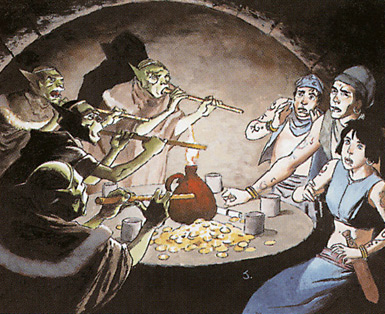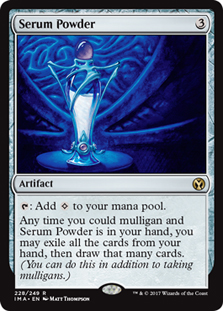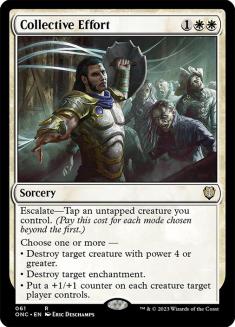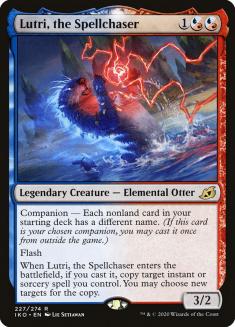Rule 0 is a foundational part of the Commander experience. Because it’s not an actual rule, we removed it during the new website update. It’s nonetheless reflected in the Commander Philosophy Document. Unfortunately, the idea is often misunderstood. It has certainly grown beyond our original intention, becoming well more than what it was designed to do—perhaps like the format itself. We’ll talk today about Rule 0, delving into both what it is and what it isn’t.
Here’s what we used to have to say about it:
There was some chatter back in the day (mostly from the rules lawyer types) that saying groups were welcome to ignore the rules meant there were no rules. That’s obviously not the case. The rules are a framework that will stand on its own without modification. Our intention with Rule 0 was for the rule set, as defined, to be the starting point, a baseline to how you formulate your own joint Commander experience. That’s not to say that you have to add, subtract, or deviation, just that the possibility is open to you—and even more so that it’s encouraged. Here’s how that’s reflected in the current philosophy document.
What It Is
Rule 0 has divided into two distinct parts. There’s the general idea that if the rule set doesn’t work for you, modify it to suit your collective needs. That could be banning/unbanning specific cards, eliminating commander damage, or changing the mulligan.
Fellow RC member Toby Elliott has a quick but accurate take:
Importantly, it’s about enhancing the good times folks will have. Toby reminded me that there was previously some different Rule 1 language, which still gets right to the issue:
It turns out that interaction isn’t just counterspells and targeted removal; it’s about expectations management. This normally happens at a play group level.
On the Commander Rules Committee (RC), for example, we agree to use the Gis mulligan, named after former Level 5 Judge and early format adopter Gis Hoogendijk. If you don’t have a playable opening hand, you set aside the seven and draw seven new ones. Repeat until you get something playable. Importantly, don’t abuse the idea of what you consider playable. You then shuffle back everything you set aside; the idea is that shuffling between mulligans is a big time-waster. We generally call having at least three lands as a playable hand.
Obviously, the rule only works with people you trust. When I’m at an event, I’ll suggest this to everyone at the table as well once someone has decided to ship their opening hand. For one, I’d rather spend time playing than watching any shuffling going on. Two, I’d rather be playing with people who are actually in the game. It’s been a very long time since I’ve personally been involved in a game in which someone has started with fewer than seven cards.
This part of Rule 0 can also happen on a larger-scale level, like at your friendly local game store. Shop owners and league organizers can sculpt how the game works to suit their particular environment. Understandably, some choose to not make any changes, preferring to use the baseline rules so that folks who might be new to the shop aren’t operating with incomplete information. I’d actually like to see them more comfortable about adapting to their own environment. Unless they’re expressly running competitive events for top-heavy prizes, the Commander experience is the group experience. Leaning more deeply into your own shop or environment’s character, whether that’s the durdliest or the Spikiest, creates a unique character. The spirit of Commander is about creating something that’s different.
The business concerns of a shop are always at play, but I believe that developing something unique and special is more likely to lead to more success than just adhering to baselines. It’s a tricky line to walk. They have to do it in a fashion that fosters a sense of inclusion, not exclusion. The best way to do that is to involve the regular player base in how things are organized and run. Too many voices will lead to disharmony and there’s not going to be 100% agreement on anything, but I find it relatively easy to recognize and capture the zeitgeist of a particular store. The idea has to be presented inclusively as well. It’s not “here’s what we’re doing to keep you out,” but “what we’re doing to bring you in.”
When LGS owners and league organizers create points systems for games, they’re effectively using Rule 0 provisions. The default win condition in a Magic game, even in multiplayer, is to be the last person standing. By making a point system, it’s possible that the first person out of the game might still be the winner.
The second major part of Rule 0 is the one which has developed in the Commander community culture. It’s the pre-game discussion of what kind of game you’d like, which may or may not have anything to do with rules. In the common parlance, it’s the chat about power level or style.
There seems to be a common misconception that you need a regular group for Rule 0 to work. It doesn’t, and it’s worked for me at events all over the world (although I get that I might enjoy a level of privilege in this regard that some folks don’t). It’s a simple conversation—what kind of game are we looking for? There are styles of games I personally don’t want to play. My desire doesn’t make others less valid, and their validity isn’t the issue. I’m not telling other people how to have fun; I’m letting them know what fun means to me. If we can’t come to an agreement, then we can each find a different game. If there isn’t more than one game to be found, we can agree to try out each other’s styles in subsequent games or find somewhere in between that will get the job done.
Groups which have already come to agreements on which rules or cards they’re doing away with can still have the pre-game discussion. Commander Advisory Group (CAG) member Josh Lee Kwai, for example, says that his group agrees to play their fastest decks for the last game of the evening. No one wants to sit down for the 11pm game and have Oloro, Ageless Ascetic show up.
Fellow RC member Gavin Duggan points out in a recent post on the Commander website that Rule 0 discussions are more difficult in some environments. In MTGO especially, in which you’re randomly seated with folks, by the time you can have the discussion, it’s too late. He also hits at the heart of the chat:
Those Rule 0 pre-game discussions are more than just power level. It’s agreeing how long you expect the game to go, what levels/types of interaction are enjoyable, etc. If that sounds like it takes effort, well, it does.
So how do we do that in an untrusted environment? Sub-formats are effective because they can be communicated quickly using just the name of the variant in the game description. If that name is self-explanatory, even better.
The rest of his post is about one of the ways to have what amounts to a Rule 0 talk beforehand—by creating well-defined sub-formats. He goes on to discuss one of them (it’s his Format Variant of the Month), which I’ll mention more about in a bit.
The heart of Rule 0 is the spirit of cooperation. It’s not a negotiation to put yourself in the strongest position, it’s a discussion that will lead to the best possible mutually agreed-on environment for the all the players in the game.
What It Isn’t
Commander Advisory Group (CAG) member Shivam Bhatt has a decent take on what Rule 0 isn’t:
That salient point here is that Rule 0 isn’t a method of undermining the rules. Some people, rather dismissively, say “it’s a casual format, do what you want.” We certainly want you to be happy while you’re playing, but we’re not suggesting you simply discard the rules. The idea is that you use them as a baseline to find the place you want to be. Rules and a banned list give a format shape and definition. “Do whatever” isn’t a format.
As Shivam points out, Rule 0 also isn’t a Band-Aid for any format-level problems. We want to create and maintain a coherent and viable structure for Commander. We don’t default to Rule 0 being an answer to difficulties that might arise. If there’s a problematic card, we don’t just leave it to groups to work it out for themselves; we take action.
Of course, there’s a delicate balance there—we can’t simply ban every card that’s problematic for someone. We have to take into account the broader demographics and the format’s philosophies. Even then, we have room for interpretation. A more conservative reading of the philosophy could certainly lead to banning more cards. As we’ve always mentioned, we’d like to keep the list as small as possible in order to open more experiences for players and to keep the messaging tight.
Rule 0 also isn’t a tool with which players can bully people into doing things they want. It somehow has occasionally gotten misinterpreted as a cudgel, which is the exact opposite of the intention. It’s about bringing people together, not driving them apart. Like with many things, it’s a beginning, not an end.
While Rule 0 isn’t unique to games (think about Free Parking and Monopoly), it’s nearly unprecedented in organized games of Magic. It’s part of Commander’s DNA, as foundational as the more structured rules of color identity, deck size, and commander damage. It will continue to be part of what makes the format into the best way there is to play Magic.
A Brief Announcement
The Commander RC now has its own Twitch channel. We’ll be gathering together to stream gameplay between the four of us, extending invitations to the CAG and a few special guests as well. Our primary time will be Thursday evenings around 7:30pm ET, but we’ll be on as frequently as time allows. We’ll also use the channel to even better communicate with the player base. You can count on us running some of those sub-formats that I mention above. In the next few weeks, we’ll be trying out Gavin’s current format of the month, 10-Tix Commander. We look forward to you dropping on by for the chat.
Visit my Decklist Database to see my Signature Decks, the Chromatic Project, and more!





